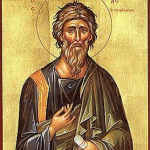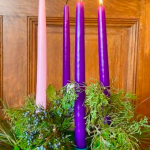(I’m so sorry for this title, it’s absolutely awful and as soon as I thought of it I had to use it, like taking a jump in checkers.)
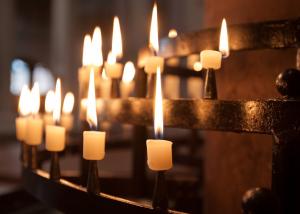
It is indeed Saint Nick’s day today! I don’t have time for a fully fleshed out post, but I did want to pop in and note a few things about the season of Advent and the saints’ days we’re coming up on.
I. Immaculate Conception This Friday!
The Immaculate Conception—which, for anyone who doesn’t know or has forgotten, is about the conception of Mary. She had two standard-issue biological parents, and this doctrine of her conception states that she was saved, by Jesus, from original sin1; the Immaculate Conception is not the same thing as the Virgin Birth, which is about how Jesus was conceived. Anyway. The Immaculate Conception is celebrated on 8 December by Catholics; besides being a specially important mystery of our faith, Mary is the patroness of the US under the specific title of “the Immaculate Conception,” so this solemnity is a holy day of obligation. This essentially means Catholics have the same duty to attend Mass this coming Friday that we would on a Sunday, and also that the normal duty of Friday penance is abrogated.
II. The Advent Collect
I won’t do a deep analysis, though I will note that the word “quick” here means “alive.” But I wanted to share the Collect for the First Sunday of Advent in the Prayer-book tradition (which is said not only on that Sunday, but every day throughout Advent), because it rules pretty hard.
Almighty God, give us grace that we may cast away the works of darkness, and put upon us the armor of light, now in the time of this mortal life, in which thy Son Jesus Christ came to visit us in great humility; that in the last day, when he shall come again in his glorious Majesty, to judge both the quick and the dead, we may rise to the life immortal; through him who liveth and reigneth with thee and the Holy Ghost, now and ever. Amen.
III. Thaumaturgus
The St. Nicholas commemorated today is Nicholas the Wonderworker, or in the Greek, Nicholas Thaumaturgus—a very euphonious word. This Nicholas was the Bishop of Myra (in modern southern Türkiye) in the early fourth century, and a survivor of the Diocletianic persecution; he was also one of the three hundred and fourteen fathers at the First Council of Nicæa.
He gained the epithet Thaumaturgus thanks to the many miracles attributed to him. The sources about his life are all pretty late, so most scholars, even those who are religious themselves, are reluctant to give them full credence. However, his profile as a rewarder of well-behaved children comes from at least one relatively early legend (which I believe was transmitted to the West in the Legenda Aurea2). The story goes that three impoverished girls had reached the point where their only option seemed to be turning to prostitution. The bishop somehow overheard a discussion to this effect, and, rather than offer them financial help directly (which might be misconstrued! or even just embarrass them), he passed their house at night on three successive nights and threw three bags of gold in at their window that were all enough to serve as the girls’ dowries.
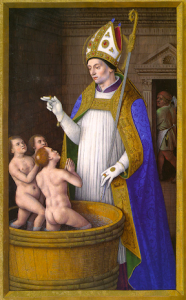
There is also a story that he resurrected three children who had been secretly murdered by a butcher and put away for pickling. I don’t honestly know how I feel about this one? Like, if some butcher did do that in real life in that time and place, I guess I hope the story about the miracle is true. But on the other hand, the horror of coming back to life (which I’m imagining as being like coming out of a coma) after making it part of the way through being pickled is way more ghastly than I had counted on dealing with today!
IV. I Prefer “The Reverend Grinch”
There is, as you have probably heard, yet a third famous story about St. Nicholas—one connected with his presence at Nicæa. According to this tale, at some point during the council, Nicholas became so angry with the heresiarch Arius that he rose from his seat, strode up to him, and struck him in the face! A refreshing change from today’s lily-livered prelates, eh?
Well, there are three problems here. One is that this almost certainly didn’t happen. Nicholas is believed to have been present at the Council of Nicæa, but no contemporary writings, either of his or mentioning him by name, survive3; there is most certainly no surviving record of anybody resorting to violence during the proceedings. Two, we’re talking about a survivor of Diocletian’s persecution here—when it comes to nerve, this man had nothing to prove!
And number three, the most important. This is absolutely a funny story, and for those who enjoy and share it purely in that spirit, it’s probably harmless; but it is, also, a story about a saint doing something wrong.
V. Advent Is a Penitential Season, After All
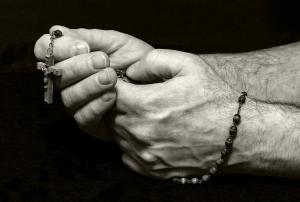
This shouldn’t be hard. I mean, “don’t hit people” is literally something we learn in kindergarten. This behavior is, as entirely as possible, the opposite of turning the other cheek. And if this be defended on the grounds that it was for a sacred cause, in what way does God need human beings to protect him?
But of course, the based Crusader avatars don’t like this because it’s a story of repentance. They like it as rationalization. People love being angry; it’s an itch that’s pleasurable to scratch, just like lust. That’s natural in its way, like cancer. Christianity isn’t. In some ways, I think the traditional cant about St. Thomas “baptizing Aristotle” has done harm, because it gives the impression that all our nature needed was a hearty scrub-down and it’s fine otherwise. That’s not the truth. We were “buried with by baptism into death,” not an inconvenience.
This difference between the new, and the old man … is a difference as real, as that between heaven and earth … When religion is in the hands of the mere natural man, he is always the worse for it; it adds a bad heat to his own dark fire, and helps to inflame his four elements of selfishness, envy, pride, and wrath. And hence it is, that worse passions, or a worse degree of them, are to be found in persons of great religious zeal, than in others that make no pretenses to it. —William Law, Christian Regeneration
1This may seem confusing at first: if Mary never had any sin, how did she have anything to be saved from? But Mary was not exempt from sin by her own white knuckles. This was a special gift of God, and (on the Catholic view) went all the way back to the very moment she was conceived—which if anything makes it more definite that she did not manage this by herself!
2The Legenda Aurea or “Golden Legend” is a collection of ancient lives of saints, which was very popular in the Middle Ages. A lot of conventional stories about the saints are traceable to the Legenda.
3This is actually not unusual, either for the ancient world in general or this period in particular. Constantine’s reign came more or less on the heels of the Crisis of the Third Century, a long era of instability during which the Roman Empire split temporarily into three fragments. (One of these, the Palmyrene Empire, was ruled by the awesomely-named Queen Zenobia.) As a result, a lot of otherwise normal records were lost or never made.


